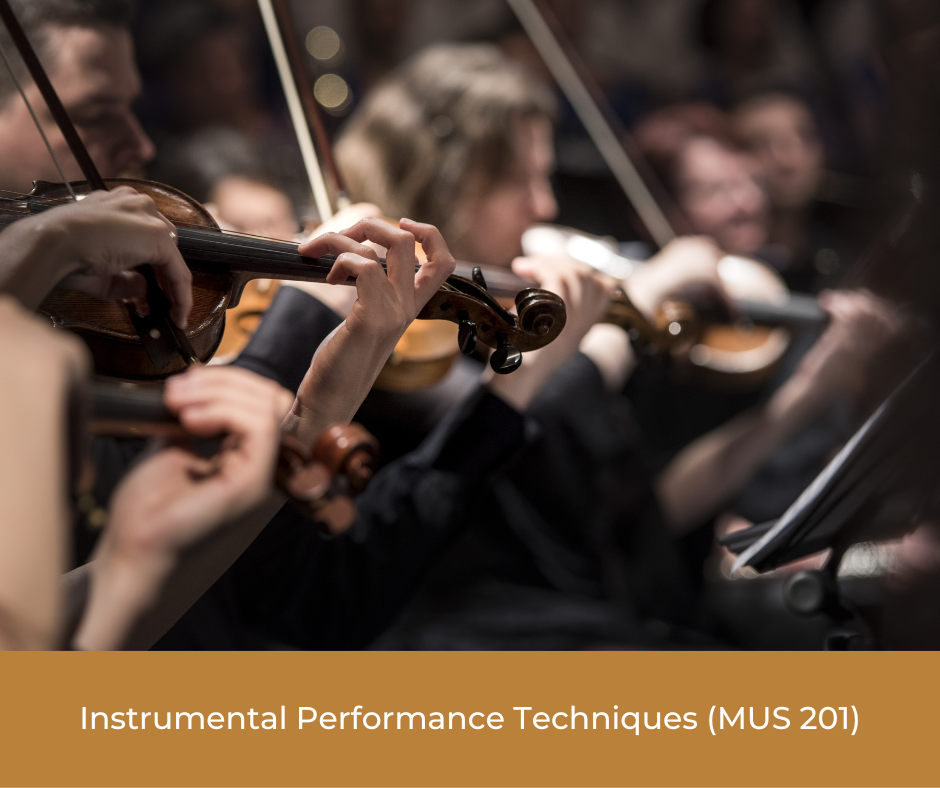Your cart is currently empty!
Music Performance Ensemble (MUS 501)

Course Description – Music Performance Ensemble (MUS 501):
MUS 501 is a dynamic course that offers students the opportunity to engage in collaborative musical ensemble performances. Designed to refine their instrumental or vocal skills within a group context, this course fosters the development of effective teamwork, stage presence, and live performance abilities. Students will work closely with their peers to rehearse and perform diverse musical repertoire, enhancing their overall musicianship.
Outline of Major Content Areas:
- Repertoire Selection and Rehearsal:
- Selection of musical pieces for ensemble performance.
- Rigorous rehearsals to refine ensemble playing.
- Instrumental or Vocal Techniques:
- Development and refinement of individual instrumental or vocal skills.
- Focus on technique, intonation, and expression.
- Interpretation and Expression:
- Exploring musical interpretation and expressive performance.
- Techniques for conveying emotions through music.
- Ensemble Dynamics:
- Building cohesion within the ensemble.
- Developing a unified musical approach.
- Stage Presence and Performance Skills:
- Techniques for engaging with an audience.
- Addressing stage fright and building confidence.
- Collaborative Musicianship:
- Learning to listen and respond to fellow ensemble members.
- Effective communication and musical collaboration.
- Live Performances:
- Opportunities for public ensemble performances.
- Applying learned skills in a real-world setting.
Course Learning Outcomes:
Upon successful completion of MUS 501, students will be able to:
- Musical Proficiency: Demonstrate enhanced instrumental or vocal skills, showing technical competence and artistic expression.
- Repertoire Mastery: Perform a variety of musical pieces from different genres and styles with accuracy and understanding.
- Ensemble Collaboration: Work effectively within a musical ensemble, demonstrating unity, synchronization, and collaborative musicianship.
- Expressive Performance: Interpret and convey emotions through music, engaging the audience with expressive playing or singing.
- Stage Confidence: Exhibit increased confidence and stage presence during live performances.
- Audience Engagement: Connect with audiences by employing effective communication and musical engagement techniques.
- Teamwork Skills: Develop teamwork and interpersonal skills through collaboration with ensemble members.
Methods for Assessing Student Learning:
To assess students’ progress and development in MUS 501, the following methods of assessment will be utilized:
- Ensemble Performances: Evaluation of students’ performances in ensemble settings, considering technical proficiency, expressiveness, and ensemble dynamics.
- Repertoire Assessments: Assessing students’ understanding and interpretation of selected musical pieces.
- Individual Skill Evaluation: Individual assessments of instrumental or vocal technique and progress.
- Rehearsal Participation: Active participation in ensemble rehearsals, including cooperation, teamwork, and engagement.
- Live Performance Evaluation: Assessment of students’ live performances, focusing on stage presence, audience interaction, and overall musicianship.
- Reflective Journals: Periodic journal entries reflecting on the learning process, challenges, and personal growth.
- Peer and Self-Assessment: Encouraging students to provide feedback to peers and engage in self-assessment to enhance collaborative musicianship.
These assessment methods will not only measure students’ musical abilities but also their growth as ensemble performers, team players, and confident stage performers.